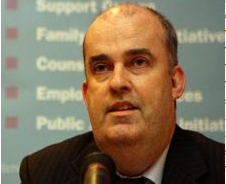Overcoming mental health stigma

Stigma is central in overcoming mental health issues and there is a need for an effective community mental health system. By Justin Frewen and Dr. Anna Datta.
According to the World Health Organization (WHO), stigma and the associated discrimination comprise the "single most important barrier" facing mental health service users. The WHO, World Psychiatry Association and World Association for Social Psychiatry, amongst others, have highlighted stigma as a key public health challenge.
As Minister for State John Molony, declared at the launch of the See Change initiative in April: "Stigma has no place in Irish society today. It damages people's lives and can be deeply hurtful and isolating, and is one of the most significant problems encountered by people with mental health problems."
(Picture: John Saunders, Director of Shine)
However, people with a mental health problem continue to be regarded with suspicion and fear, leading to low self-esteem, reduced employment prospects, difficulties in obtaining accommodation and broken relationships.
Stigma in Ireland
A 2002 National Disability Authority study - Public Attitudes to Disability – found that while 82% believed a disabled person should enjoy equal access to employment as non-disabled people, only 55% thought this should apply for those with a mental health problem. Similarly, only 55% felt a person with a mental health issue should have the same entitlement to fulfilling relationships as the general public.
The 2007 SLAN report revealed that 52% agreed or strongly agreed with the statement 'If I was experiencing mental health problems, I wouldn't want people knowing about it'. HSE Research found one-third of Irish people afraid to talk to those diagnosed with a mental illness.
A recent See Change survey - Public Attitudes Towards Mental Health Problems - noted that although 94% of Irish people realised anyone could experience a mental health problem, around 50% would keep it secret if they had one. A disturbing intolerance was also evident with 33% believing people with schizophrenia should not be allowed have children.
What is Stigma?
The term stigma dates back to ancient Greece where it denoted ownership marks on slaves. During the late 16th and early 17th centuries stigma became an indicator of humiliation and degradation.
Erving Goffman was instrumental in developing the modern meaning of stigma as 'spoiled identity´, by which mental health problems are regarded as shameful. Goffman described how 'Courtesy Stigma' - stigma-by-association - can result in family, friends and carers being blamed for a person´s mental health problem or even accused of sheltering potentially dangerous people.
'Self-Stigma´ arises when a mental health service user internalises feelings of culpability, shame and inadequacy and wants to keep their condition secret.
Negative Consequences
Potential mental health service users are often discouraged from seeking assistance, lest others find out about their condition. Stigma regularly discourages mental health services users from participating in their local community or from applying for work despite being qualified.
Stigma also dissuades people from offering help or being supportive. As John Saunders, the Director of Shine (formerly Schizophrenia Ireland) explains: "Research consistently shows that peoples´ attitudes towards mental health cause unfair treatment, social exclusion and isolation of children and adults who are experiencing mental health problems. Uninformed or distorted ideas can lead to discrimination."
Discrimination arises both interpersonally when mental health service users are excluded from everyday social interaction and structurally when they find their participation in public life obstructed by explicit or implicit economic, social, legal, cultural and institutional barriers.
Stigma can also have a devastating impact on one´s recovery prospects. Indeed, stigma can be more enduring and debilitating than the original issue and even lead to a cycle of worsening socio-economic prospects and persistent, ongoing mental health problems.
At the broader level, stigma hinders mental health system improvement and reform. As the US Surgeon General´s 1999 Report on Mental Health emphasises: "Stigma erodes confidence that mental disorders are valid, treatable health conditions... Stigma deters the public from waiting to pay for care and, thus, reduces consumers' access to resources and opportunities for treatment and social services."
Tackling Stigma
Treatment in psychiatric institutions, which isolates the mental health service user from the community, contributes to stigma. An effective community mental health system would ensure minimal disruption to the everyday life of mental health service users and minimise their exclusion from the local community.
The treatment of mental and physical ailments should be co-located as far as possible as this segregation also plays a role in stigma.
International research has shown that modest and well-targeted anti-stigma programmes are generally more successful and sustainable. Furthermore, mental health service users and their families must be involved at all stages of all efforts to combat stigma. Although the manifestation of stigma may vary, it is crucial to build on what has worked abroad and share experiences with similar initiatives internationally.
At the personal level, it is important to provide empathetic support to family, friends or colleagues experiencing a mental health problem. One should avoid being judgmental, resist forcing the issue and respect the limits of the person with a mental health problem.
Stigma is not the only obstacle impeding mental health service users from full participation in society and should not be the sole focus of a mental health programme. However, given the widespread ignorance regarding mental health problems, every effort should be made to confront stigma and its attendant discrimination.
